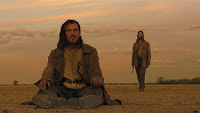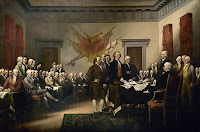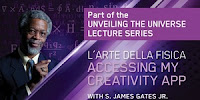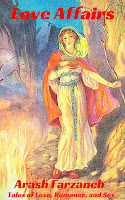The
Proposition (2005) is written by alternative rock musician
and occasional novelist Nick Cave and is directed by John Hillcoat, perhaps
better known for his later atmospheric yet quite depressing movie The Road (2009).
At first glance, the movie may appear like a typical revenge
western flick albeit set in the Outback of Australia instead of the Wild West
of the United States. It has the components of a generic western, a sheriff (in
this case the British officer Captain Stanley) who is chasing a band of outlaws
led by three brothers.
Yet from the get-go, the mood and situations become
already more morally complex compared to any other traditional Western fare.
The movie opens with the lines of apology that the following images of indigenous ancestors may be offensive to some and then sets the tone with the beautiful and heart-wrenching background
hymn of “There is a Happy Land” sung by the innocent voices of a children’s
choir.
Yet there is neither in this rugged sun-drenched terrain,
no happiness and even less innocence. The theme of land and religion is
interwoven into this movie yet do not combine to create the peace and harmony
they apparently so desire; they only make matters worse.
After the opening credits, we are immediately thrown in a
shoot-out followed by an arrest of two outlaw brothers, Charlie and Mikey Burns.
In its aftermath interrogation, Captain Stanley makes an indecent proposition
to Charlie. The law enforcer decides to keep the younger brother Mikey, who
seems the most innocent and naïve of the bunch, as leverage in custody and asks
Charlie to find his older and much meaner brother Arthur and kill him.
In turn, Stanley gives his word to not hang the younger
brother of the gang; he even promises to give them both pardons. Evil is
supposed to be stopped by an even more evil and heinous act, the killing of a
sibling, but in the eyes of the captain the means end up justifying the end.
One must add that Charlie does not like his older brother
Arthur very much and he is a kind of caretaker of Mikey (a nickname purposely
underscoring his young age) and the reason they were not hanging with each
other was because of growing ideological and moral differences between them; in
other words, Charlie and Mikey are in comparison much more decent guys than the
mean-spirited Arthur. So Charlie goes out on his mission; he is given nine days
and his deadline is fittingly Christmas Day.
The reason the British officer risks letting Charlie get
away is that Arthur is the hardest to pin down. He is hiding in caves and seems
literally untraceable. At the same time, the bandit seems to be protected and
feared by the aboriginals around him and they somehow admire him for his lack
of conventionality. This man is different from the “civilized” people who
disperse the natives and look down on them and who are in the meantime slyly
stealing their lands and livelihood.
Outlaws and the native people have something in common;
they are both rejected by the colonizing white class and have to hide
themselves. In fact, in the eyes of the aboriginals, Arthur becomes a kind of
mythical beast; they do not think of him as human but call him the “Dog Man,” a
rabid and smart being that is impossible to stop.
We are then slowly given clues of how cruel Arthur really
is. Although Charlie and Mikey seem the “nicer” criminals with at least a
scruple or two and something akin a conscience, Arthur and the other band
member Samuel Stoat are pure undiluted evil. They are mostly responsible for
the slaying of the Hopkins family, which included a pregnant woman who had been brutally raped.
This horrible and vicious crime is the main reason why
the town and its captain would do anything to not only catch this band but to
hang them. In fact, while Charlie is on his way, there is a strong desire to
whip Mikey for his crimes; in fact, they want to flog him a hundred times. This
would kill the boy, Captain Stanley counteracts, especially keeping in mind
that his promise and proposition would immediately turn to dust.
Yet as gossip continues to spread far and wide that the
captain had let one of the brothers get away scot-free, the town is angered
both with him and his beautiful wife and they all turn their anger on Mikey who
serves as a scapegoat for all the suffering they have gone through.
Even the captain’s wife insists that the boy should be
whipped as the raped and murdered woman was a close friend of hers. Captain
Stanley has a standoff basically with the whole town including his superior and
his wife, as he stands in front of the prison and threatens to kill anybody who
crosses the threshold and puts a hand on this incarcerated youth.
But his wife then implores him to give this criminal the
whipping he deserves. She entices him by reminding him of the seriousness of
the crime as well as tempting him with the statement, what if it was she who
had been helplessly raped. Would he still protect this member of the gang?
Reluctantly, as he is also outnumbered and without any
moral support whatsoever, Captain Stanley lets them punish Mikey and after 40
lashes (yes, this is a reference to the Lamb Jesus since Mikey similarly takes
on the sins of others, namely those of his brothers) the youth is on the border
between life and death and dies from his wounds around Christmas, which
inversely is the celebration of the birth of Jesus.
In the meantime, Charlie manages to find his evil brother
but hesitates. Arthur sits like a meditating monk on a cliff overlooking the
sunset and he seems to never sleep. At the same time, he is spouting random
lines of poetry about the moons, the stars and the sun and how love holds everything
together. There is a crazy glint in his eyes and a wild demeanor all around his
behavior; yet at the same time, his intelligence and poise give him a certain
air of dignity.
Arthur also keeps harboring on family ties, which, he
claims, is the only thing that matters in the world; then he asks about Mikey.
Charlie, in order not to raise any suspicion and so that he does not give away
his own ethically dubious proposition, tells him that Mikey has remained in the
town because he has met a red-headed Irish woman. This at first pleases Arthur
especially since they are Irish themselves.
I will not give away much more about this movie, but it
does end in violence and interestingly everyone who has a bloody hand in it
gets punished one way or another. This is why the movie may seem like a traditional
western, but penned by a musician-poet like Nick Cave it is also much more.
Apart from giving us a strange poetic psychopath, he also
presents us the thoughts and motivations of the British about this rugged, for
them God-forsaken land. They are racist as can also be seen in the way they
mistreat these natives, but ironically the outlaws seem a little bit more
accepting than the regular town folks.
When one of the aboriginals gets killed, Captain
Stanley’s supervisor is worried, not because a life has been lost but because
he thinks that the natives will take revenge, a life for a life, as he says. The
law enforcement has hired an aboriginal guide who tracks and translates for
them; the guide is later killed by Arthur who accuses him of being a traitor,
which is partly true as the aboriginal guide was helping out the whites, perceived
as the common enemy of the land.
Furthermore, Captain Stanley has an aboriginal servant
working for him. He does not mistreat him in any visible or discernible manner,
but his haughty outlook and his feeling of superiority are always visible. The
British set themselves the mission of “civilizing the land” as Captain Stanley himself puts it succinctly; incidentally, the tagline of the movie is “This land will
be civilized.”
In a poignantly symbolic scene, the servant who has
finished his shift on Christmas Day and who is leaving the ranch of the
Stanleys, takes off his boots and socks and leaves them by the gateway
continuing his quest back home in bare feet according to his own customs and
traditions. It is a manner of rejecting what the whites see as civilization; the
aboriginals may accept it superficially because they have no other choice.
Another scene is when John Hurt, who plays a well-read
and well-traveled drunkard / bounty hunter (yes, the characters are quite
quirky in this film) talks about Darwin’s evolution theory. He is shocked that
humans could have possibly originated from the monkeys because that would mean
there is little difference between the blacks and the whites, in his own slurry
words.
This is the blow that not only humanity had to endure,
but mainly the whites who felt themselves superior or God-chosen. Since we all
come from animals and are firmly embedded in this physical world and since our
earth is just another planet and not the center of the universe as had been
previously assumed, that made us all a little more insignificant in the grand
scheme of things.
All in all, the whites are disturbing the peace of this
land. They are the ones who are committing crimes and brutally punishing the
culprits. They show absolutely no respect for human life, least of all the
native aboriginals, the original inhabitants of these lands. It seems that
their so-called civilization is only making matters worse and the violent and
bloody ending bathed in red sunlight only shows us that little good has come
from these supposedly civilized settlers.





